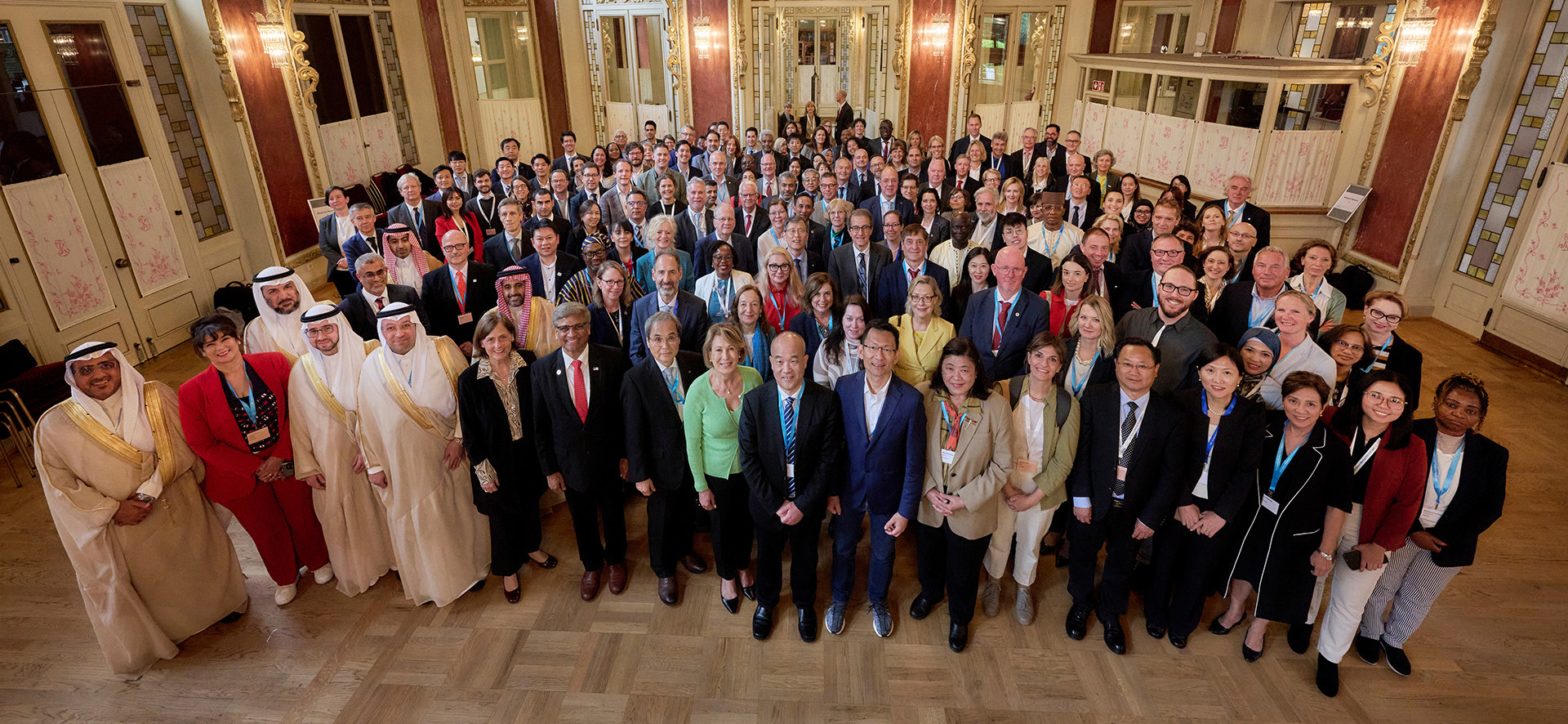2024 Annual Meeting

The 12th Annual GRC Meeting was held from 27–31 May 2024 in Interlaken, Switzerland. The event was co-hosted by the Swiss National Science Foundation (SNSF) and the Fonds pour la Science, la Technologie et l'Innovation (FONSTI), Côte d'Ivoire’s national funder. The Global Research Council brings together heads of research funding agencies worldwide, to foster exchange and share good practices.
In total, 257 participants from 52 countries contributed to lively discussions in the side events and the Annual Meeting. The Annual Meeting itself on 29 and 30 May was attended by 68 Heads of Research Councils. These attendance numbers show the great attractiveness and importance of the GRC. Matthias Egger, President of the SNSF Research Council, comments as follows: “We are living in dynamic times with fast-paced change and global challenges. It is our responsibility to contribute to the goals of sustainable development through cooperation in research.”
The first two days of this week were dedicated to side events hosted by different GRC participant organisations. On 27 May, side events focused on the topic of multilateral engagement. The day was chaperoned by the GRC Working Group on Multilateral Engagement, who introduced and guided participants' discussions throughout the day. During the day, several examples of multilateral cooperation such as the Global Centers Programme were showcased. The sessions raised topics around developing skills and networks for cross-border cooperation, discussed power dynamics in international collaborations and how to strengthen responsible internationalisation. For Yaya Sangaré, Secretary General of FONSTI, it is particularly important that this takes place on equal terms: “As representatives of the Global South, we believe it is important that we not only benefit from the experience of our partner organisations, but that we can also contribute as partners of the Global South. We view our partnership with Switzerland as a model for future North–South cooperation in the GRC.”
The second day hosted side events on various topics of international relevance. Topics included artificial intelligence in research and innovation, the integration of social sciences and humanities in research, responsible research assessment, infrastructures for a greener future, equity, diversity and inclusion as well as equity in open access publishing. The side events were selected following a call with a high number of submissions.
The Annual Meeting itself was dedicated to the topic of “sustainable research”, with the following three priority areas:
- Research for Sustainable Development
- Making research itself sustainable
- Making sure sustainability science matters
This year’s discussion contents, guiding questions and final statement were prepared and accompanied by a joint Swiss–Ivorian Scientific Committee. In regular meetings, the group of experts on sustainable research from academia and civil society drafted a discussion paper the Statement of Principles. For the co-hosts, this newly introduced way of working together and preparing the contents of the Annual Meeting proved to be very productive and effective.
Several experts and representatives of research funding organisations gave presentations and participated in panel discussions in the three thematic blocks.
The discussions during the Global Research Council meeting and the consensus reached between the participating organisations is reflected in the Statement of Principles on Sustainable Research that was adopted at the event. Key elements of the statement are:
- Responsibility: Funders are aware of their influence on scientific systems and the importance of setting a good example themselves. They recognise their role in ensuring that research contributes to sustainable development.
- International cooperation: Addressing global challenges require cross-border cooperation between equal partners and experimentation with suitable funding formats.
- Specificities: Research for sustainable development must include various perspectives from society so that its contribution will succeed in the long term. Researchers require specific inter- and transdisciplinary as well as intercultural skills. It requires financial support that is sufficiently flexible and permits long time horizons.
- Focus on incentives and barriers: Research funding organisations should adopt and promote sustainable practices (e.g. travel and mobility, waste management, gender equality, social inclusion, quality over quantity, employment conditions) and support a cultural change towards sustainable and responsible research assessment (e.g. quality over quantity, diversity of research approaches, etc.)
- Connection to society: Researchers and their funding institutions engage in a dialogue with society; they recognise its needs and include these in their work. Credible, traceable action builds trust in science.
This year’s GRC also featured a poster session, where participant organisations could showcase examples of contributions toward sustainable research. 14 posters involving 12 different countries where exhibited. This includes topics like addressing specific funding opportunities (e.g. Solution-oriented Research for Development (SOR4D) programme of the SNSF, Advancing Leadership to Address Global Change Challenges of the Belmont Forum, Natural Laboratories for Sustainable Development of Chile, sustainability strategies (e.g. Japan Society for the Promotion of Science, Oman, Qatar) or on meta-analysis of funding (e.g. SDG contribution analysis of funding at the Swiss National Science Foundation).
Overall, this year’s GRC was a fruitful opportunity for exchange among GRC participants. The Vice Chair of the GRC Governing Board and President of the German Research Foundation (DFG), Katja Becker, expressed that “the GRC supports research funders around the world in making an important contribution and taking responsibility for future generations.”
Next year’s Annual Meeting will be co-hosted by the King Abdulaziz City for Science and Technology (KACST) of Saudi Arabia and The Scientific and Technological Research Institution of Turkey (TÜBİTAK). It will take place from 18–22 May 2025 in Riyadh, Saudi Arabia.
